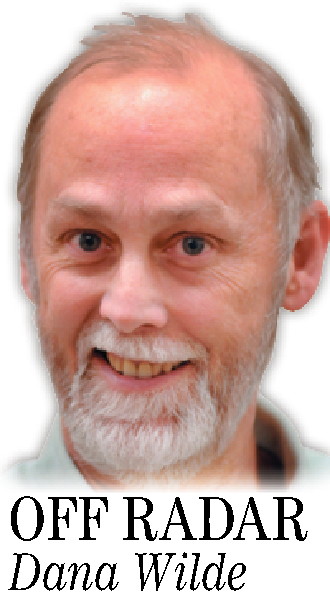The Cafe Review Vol. 30, Spring 2019; Steve Luttrell, founder and publishing editor; XPress, Portland, Maine; 72 pages, perfect bound, $10.
Detritus 4, June 2019; Chris Peary, editor and publisher; detrituspress.com, Bangor, Maine; large format, 68 pages, saddle-stitched with screen-printed cover, $16.
In the late 1980s, one of Portland’s gathering spots for off-the-radar poets and artists was Cafe No, attached to Pat Murphy’s Yes Books shop on lower Danforth Street. Steve Luttrell, a mainstay of Portland’s underground poetry-readings scene, ring-led the formation of a literary journal sprung from the gatherings and called it The Cafe Review. The first issue ran in 1989, and the journal continued publishing Maine and international poetry and art four times a year. It’s still going strong, winning two awards for Best American Poetry along the way and celebrating its 30th anniversary this year.
Luttrell explicitly thought of Cafe Review as the heir to Contraband magazine, probably Maine’s best-known contribution to the literary counterculture of the 1970s. Contraband’s aesthetic roots grew from the Beat and Black Mountain scenes of the 1950s and ’60s, publishing such writers as Peter Kilgore, David Empfield, Albert Frank Moritz and also Stephen King, a UMaine classmate of Contraband editor and co-founder Bruce Holsapple. The last edition was issued in 1980, and Holsapple published several more books under the Contraband Press imprint in the 1980s and ’90s.
The current issue of Cafe Review, guest-edited by Ontario poet and retired professor Bob Hogg, features Canadian writers, some of whom also have links to the Beat and Black Mountain past. Stephen Collis, of Vancouver, offers, for example, “Sketch of a poem ending with lines by Robert Duncan,” a kind of implicit homage to Duncan’s expansive style. And Bruce Whiteman, of Toronto, contributes a deftly crafted, almost wistful short lyric, “The American Poet Ezra Pound Recommends Peanut-Butter to His Italian Friends” – Pound having been perhaps the greatest influence on poets such as Duncan and Charles Olson. Fans of 1990s and early 2000s late-night radio will appreciate Sharon Thesen’s clever poem “Art Bell.” The issue also contains a review of “Balancing Act 2: An Anthology of Poems by Fifty Maine Women” published by Littoral Books of Portland.
As part of Cafe Review’s 30th anniversary celebrations, Luttrell and Holsapple, who now resides in New Mexico, will be reading their poetry 6-7:30 p.m. Friday, July 5, in the garden of the Longfellow House, 489 Congress St., Portland. The event will also provide a moment to introduce “Quarry: The Collected Poems of Peter Kilgore,” the Portland native who was one of the principal forces and poets in the Contraband project during the 1970s.
• • • • •
Also just released is Detritus 4, the latest edition of the art, comics and writing magazine published and edited by graphic artist Chris Peary, of Bangor. This issue runs head-on into the world of backwoods science fiction, fantasy and, by the end, alternate reality.
Peary contributes a characteristically wry black-and-white comic, “Sulcus,” in which astronauts try to figure out how to approach a perplexing planet. Adam Wyatt Lacher’s “Slogan Program” is a collection of creepy, doodle-like line drawings of demonic faces and Hieronymous Bosch-like figures saying weird things in balloons, such as “THROW it in the Fridge / for MAXIMUM / FRESHNESS.” Graphic artist Chelsea Ellis, of Hallowell, offers digitally manipulated photographs in her “Of Body” project, comprising softly sexy imagery of not only human body parts but of elongated interpenetrating plastic forms. Three poems (full disclosure: by me), such as they are, cover alien abductions and signs of life on the moon.
Down-to-earth is one of Mount Desert Island artist Amy Gagnon’s strangely simple, mute comics, “The Road to Yesterday,” portraying a quiet but hypnotizing domestic life in the woods. A battery of tersely made poems by Sarah Farnham lays out raw emotions on the struggles of simply living (“when you have been told / for the entirety of / your existence / to stop talking, // you do”).
The issue is rounded out by a contraption-oriented drawing by Kenny Cole and “Astronomical Study,” a drawing by Amanda Kahl of a stack of books and an ancient celestial globe set against deep, starry space.
These close the magazine after Eryk Salvaggio’s extraordinary alternate-reality story, “Sarah Palin Forever.” A young girl and her mother are trapped in the repeating, Groundhog Day-like events of a rally at the Bangor airport for the vice presidential candidate of 2008. Referring to the other rally attendees as “loopers,” the girl describes seeing the same bewildering things occur over and over without change. “‘I know this is hard to understand,’ my mom would say. ‘But she isn’t a person. She’s just a thing that happens.’”
Copies of Detritus 4 (and 3, 2 and 1) are available by writing to chris@chrispeary.com or to the Editor, Detritus Press, 31 Central St., Suite 315, Bangor, ME 04401.
Off Radar takes note of poetry and books with Maine connections. Dana Wilde is a member of the National Book Critics Circle. Contact him at universe@dwildepress.net.
Send questions/comments to the editors.



